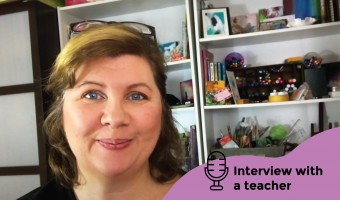Informal education is an occasion when we learn something without even realizing that we are learning. It may happen when we are talking to our friends and family or even strangers. For instance, when buying a house you may discover what the word ‘escrow’ means after the estate agent explains it to you. It is involuntary and occurs during everyday activities that we may engage in daily. It involves no planning or intention from the learner to acquire new knowledge.
Asking questions, receiving advice, problem solving, watching videos and browsing on social media can all be examples of informal learning. So every time you asked your relative to help you out with cooking advice or asked a colleague to help you to solve a task – you were in fact engaging in informal learning.
What are some common examples of informal learning?
- Listening to a podcast
- Going to a workshop
- Joining a new hobby club
- Talking to a friend about their interests
- Asking questions
- Reading about new concepts
- Observing someone or something
- Researching new activities online
- Trying an online course in something that interests you
Your interest may be sparked unintentionally by carrying out one of the activities above, and then a large proportion of informal learning is self directed. This can carry a variety of benefits for you and your career.
For example, there are no costs or deadlines with informal learning, which means that you still have time to focus on your career whilst gathering new knowledge. Furthermore, it develops your ability to motivate yourself, which can be beneficial for your career in terms of beating procrastination and working to achieve your goals.
However, the benefits do not end there. There are numerous advantages which you can gain as a result of informal learning. Do you know what they are?
#1 You can learn from anyone
You don’t need to learn from a teacher or someone who is an expert in a particular field. Informal learning allows knowledge to be passed on from anyone, in any way. You could be talking to your friend who works in marketing who may teach you a top tip for growing a business, or you may be watching a video on social media which you can learn some fun facts from. The content you learn can then be transferred into your career.
#2 Less chance of boredom
We can all remember that one college class in which we would be counting the minutes until the end. This does not occur with informal learning. There is no procrastination or boredom to impede you. You are the driving force, meaning that your interest, curiosity and excitement is the motivation behind your learning. You can be the one asking the questions, researching and investigating in order to gather knowledge, rather than being forced to by a teacher bombarding you with homework.
#3 Less resistance to learn
Similar to the previous point, there is nobody forcing you to learn. This means you are less likely to resist learning the new material. We are much more likely to complete tasks that we set for ourselves in comparison to those set by others as in this situation, we are motivated by our curiosity and excitement.
#4 Does not require prerequisite knowledge
Unlike many school or college courses, informal learning does not require previous experience or learning of the topic. You are free to start learning regardless of the situation you are in, whether it is from scratch or with a great deal of expertise. Informal learning does not discriminate.

#5 Create an interest that would not have been created otherwise
Informal learning often sparks an interest that would not have been sparked in any other way. For instance, in school if you knew nothing about a particular subject and had no plans to learn about it, it is unlikely that you would select to study this subject during your time at school. However, when conversing with a friend or watching a video about the same subject, something may spark interest and encourage you to research the subject in more depth. Informal learning rewards curiosity in this way, as you become excited by and satisfied with the new information which you learn.
#6 No costs
We have all heard about college fees, accommodation costs and living expenses when it comes to studying in higher education. We have all heard about the budget cuts in schools, rendering them unable to provide all of the materials that may be required for students. The good thing about informal education is that it is cost free. You can learn without worrying about the constant financial requirements.
#7 Immediate
Informal learning occurs directly and immediately, rather than after a long period of studying and researching. Of course, to develop the content learnt from informal learning further after the initial stages, studying and researching can be carried out. We all have busy schedules and wish to learn as quickly as possible (whilst still learning effectively). Informal education allows you to continue focusing on your career and work projects whilst learning new things.
#8 Learning can be done at any pace
Content and learning materials can be consumed at the pace which the learner feels comfortable. This means that you are not rushed or overwhelmed with the information at any time. You can learn at your own pace, revisit any areas that you found difficult, research more about areas that interest you and digest the information with ease. This can even help you to understand more about the study techniques which work best for you. This means that you can prioritise your work deadlines and still learn new things that can later be incorporated into your professional life.
#9 Learning is autonomous and self-motivated
This type of learning is driven by one person. Yourself. Nobody is there to motivate you, monitor your progress or attendance. You are in full control of your learning journey. If your interest is sparked, it is your decision whether to continue researching and learn about the concept in more depth. Timetabling, sourcing materials and future learning arrangements are your responsibility. Self-motivation is an extremely useful skill to acquire and apply to your professional career, as you learn to maximize your potential, achieve your goals and become the best that you can be.

Are you ready to invest in yourself?
Informal education provides solutions to particular problems that can be evident with formal education. Boredom, resistance to learning and excessive costs are not an issue with informal learning as it is centred around the interests of the student and does not require expenses.
There are also several benefits that can be gained from informal learning. You can develop your ability to motivate yourself and discover more about which learning methods work for you. Both of these skills can be applied to your professional career.
When you become the best self-motivated person you can be, you can put your head down and work for that promotion.
When you find the ways that you learn best, you can prepare for that presentation to the best of your ability.
Informal education carries benefits for everyone, and can even pave the way to lifelong learning. Engage in informal learning and improve your performance in your career today.
Ready to start learning? Join InfoDepot and kickstart your learning journey.





1 Comment
Amazing blog everything is explained very well.